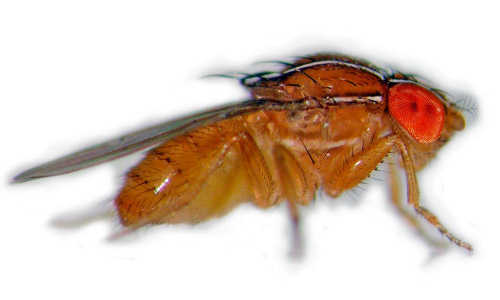Researchers study how group interaction influences where female fruit flies lay their eggs
Fruit flies do not always conform to the norm. When female fruit flies have to decide where to lay their eggs, they take their lead from what they see most others in their group do. However, some do take their personal preferences into account. So says Marine Battesti of the Université Paris-Sud in France, lead author of a study in Springer’s journal Behavioral Ecology and Sociobiology.
The site on which an insect chooses to lay her eggs is very important for the development and survival of future generations. Such choices are not fixed, but are influenced by the environment, genetics and the social context. Previous work by Battesti showed how inexperienced or naïve Drosophila melanogaster females use social cues to choose where to lay their eggs, and that such socially acquired preferences can be transmitted within groups.
To follow up on this, Battesti and her colleagues watched what happened when groups of naïve “observer” flies were given two possible sites on which to lay their eggs: either a banana-flavored location, or a one that was strawberry-flavored. The observers were first mixed together with “demonstrator” flies that were already trained to prefer one of the two media, and then allowed to choose. The observers also had the chance to experience the two flavors for themselves.
The researchers found that fruit flies largely – but not completely – conform in their choice of sites on which to lay their eggs to cues from their social group. Observers acquired a preference for banana when at least 25 percent of the demonstrators were trained on banana, while they acquired a preference for strawberry only when all demonstrators were trained for this preference. This shows that even the presence of a small proportion of individuals trained to lay eggs on banana is enough to induce a biased preference for this tropical fruit. The preferences of observer flies are therefore highly sensitive to the social composition of the demonstrator group.
Importantly, not all fruit fly females conformed to this norm. Whereas observer flies were strongly influenced by their social environment, demonstrators were not. Each individual fly behaved according to personal information and ignored the social environment. This happened even when most of the other demonstrators in the group were biased towards one of the flavor mediums.
According to study, the results suggest that fruit fly females combine their personal preference with social information to choose sites for their eggs, rather than showing complete social conformity. Battesti noted, “Individual decision-making is the result of complex interactions between different social and personal information sources in response to environment variation.”
Story Source:
The above story is based on materials provided by Springer.





